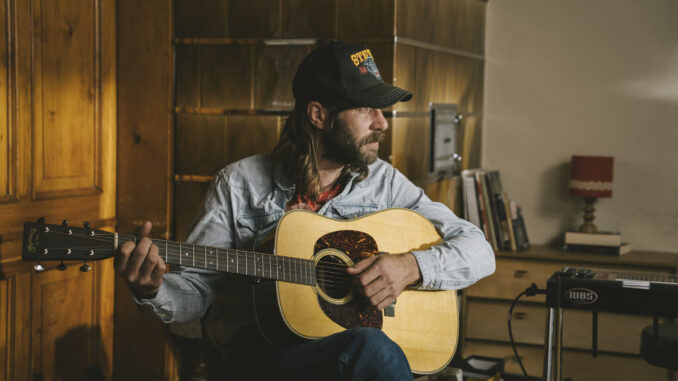
Rick Bayles’ new series takes a fortnightly look at Americana music’s influence and representation in continental Europe.
Music based on roots music associated with America has become increasingly popular in recent years and has spread to other countries with increasing success. I want to see not only how this spread of americana music has progressed in mainland Europe, but how the music is now being influenced by European artists and how this might change what we call americana. In many ways, this music has come full circle, since it was the folk music of Europe that travelled across to America with the early settlers and became incorporated into American roots styles. Now that American roots music is gaining popularity in Europe is it again being influenced by European culture?
As a Brit who now lives in S.W. France, and who plays in a local americana band, I’ve seen the growing interest in the music, as well as witnessing opposition to an anglophone musical genre in a country that’s fiercely protective, and rightly so, of its own cultural identity. There’s no question that the spread of americana in Europe faces problems, but it’s also a market that offers great opportunities to those musicians daring to be that bit different, as I hope this series will show. All the artists I talked to for this series have, at one time or another, been identified and/or reviewed as an americana act.
We start with the alphabetically appropriate Austria, a country more typically associated with Strauss and Mozart than with the picking of banjos and the chiming of a pedal steel guitar and, it must be said, the americana scene in Austria is a small one. In fact, according to Austrian native Christophe Comper, the scene consists of a single artist, Prinz Grizzley and his band, the Beargaroos. Given that Comper is Prinz Grizzly, he might have an ulterior motive for suggesting he’s the only game in town, but further investigation suggests he’s not far short of being right, though there is one other contender in the Austrian Americana market.
Talking to Comper, I wanted to know what’s the appeal of americana to a musician who grew up in the Austrian Alps. “I try to stay open to all kinds of music from everywhere, but a lot of my influence comes from different American artists. This Americana genre is so awesome. On an album, you can put a blues song next to a country song, followed by a soulful rocker, and nobody gets hurt. There’s so much diversity. For me, that means total freedom. Funny thing is, for me, there are already a bunch of my cultural influences in this kind of music. Be it the yodelling in early country music or the chord structures and harmonies in Bluegrass, it all has its roots in Europe. So, for me, it’s kind of rediscovering some cultural elements in music made across the ocean.”
I wondered whether he actively markets Prinz Grizzley as an Americana act and who his audience is. “That really depends on which outlet I am trying to reach, but I mainly use Americana artist. It’s great because sometimes they don’t know what that means, so they have to listen to it, and I am not put into a box right away. Our audience is mainly people who listened to indie folk pop and grew out of it. But there’s not really a stereotype; my audience ranges from 25 to 65, with men and women nearly equal. I have rockers, country enthusiasts, pop chart lovers, all kinds. And that’s great!”
Grizzley first appeared on record with his 2016 EP, “Wide Open Spaces”, with full-length albums following in 2018 (“Come On In”) and 2020 (“To My Green Mountains Home”). This year has seen the release of his third album, “Dear Leftovers”, which came out to considerable critical acclaim. Over the years he has toured extensively throughout Europe and America, including appearances at SXSW in Austin, Texas and at Americanafest in Nashville. Sadly, Austria doesn’t see a flow of americana artists coming the other way, and Comper bemoans the fact that “all the American americana acts seldom come any farther south than Berlin.”

Son of the Velvet Rat are built around the husband and wife team of Georg Altzeibler and Heike Binder, who started out in Graz in Austria but now split their time between their home country and Joshua Tree in California. They reject the notion that they’re an Americana band, with Altzeibler saying that “Americana is a marketing label created by media and music-business people. Great songs tend to defy any categorisation”. A fair point and one raised by other European musicians I talked to, but when you cite one of your main influences as Townes Van Zandt it is, perhaps, inevitable that the americana tag will be applied. The band’s music has also been described as ‘Folk Noir’ and ‘Desert Noir’ and there is a darkness running through their music that is a very strong part of their appeal and does give them a very distinctive sound. Their latest album, “Ghost Ranch”, released earlier this year, is their 11th album since the debut “By My Side”, released back in 2003, and includes guest appearances from Jolie Holland on violin and vocals. A previous album, 2011’s “Red Chamber Music” included a collaboration with Lucinda Williams, so that americana tag isn’t going away anytime soon!
Talking about the americana label, Altzeibler went on to say “Americana is a geographical term and it aims to describe the roots of a certain sound. So, in a way, we are definitely influenced by the sound of old folk- and country songs. However, we’ve always been inspired by European songsmiths like Georges Brassens, Jacques Brel or Fabrizio de Andre and Gian Maria Testa.”. This is an important point because it has been echoed by a number of other artists I’ve spoken to in other countries and it suggests that a lot of European americana artists look to the roots music of America to supply the musicality of their songs, but lyrical inspiration is more often drawn from the great wordsmiths of continental Europe. George Brassens, in particular, has been referenced by a number of our songwriters. I think this shows that what we would, broadly, think of as americana artists in Europe, are creating a form of the music that is becoming distinct from the source material. I asked Georg Altzeibler how he thought his own culture influenced his music. “Of course, our music is influenced by our own culture. I’ve been listening exclusively to classical music for the first 10 or 11 years of my life. Mozart, Bach, Hayden and Beethoven were the soundtrack of my childhood. Sometimes I like to think that their melodic approach has found a way to reflect in my own songs.”
Perhaps Altzeibler’s more aesthetic approach to music explains his response when I asked what sort of audience the band attracts. “Hard to describe. All I can say is that we have many songwriters among our fans, both in Europe and in our second home in Joshua Tree/CA”. In fact, this also ties in with responses from other artists in this series, who frequently mention that their audiences seem more interested in the music than anything else, that for them it’s about good music first and foremost, something that I think is symbolic of americana music fans in general.
The americana music scene in Austria is, clearly, a small one, but the fact that it can produce artists as interesting and different as Prinz Grizzley and Son of the Velvet Rat shows that the music is making inroads and creating impact throughout the continent.
I asked Christophe Comper/Prinz Grizzley how he sees the future of americana music in Europe “I think we have a lot of great artists over here in Europe, and we don’t have to hide! We’ve got some great awareness for Americana in some countries, like the UK, Netherlands, and Sweden, but it would be nice to expand that into Germany and France. But for that, an Americana artist would need a hit on mainstream radio, and that won’t be happening too soon. I guess we have to endure a little longer in our tiny bubble, but that’s alright!” I’d agree with much of what he says, though I don’t think mainstream radio is necessarily the key to the future success of the genre. There are some great bands out there and people just need to discover them. Hopefully, these articles will go some way to widening appreciation for European americana.


